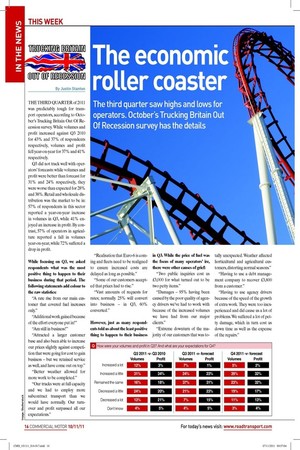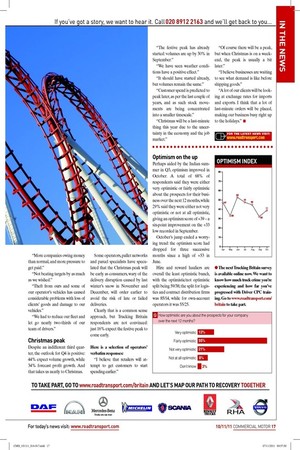The economic roller coaster
Page 11

Page 12

If you've noticed an error in this article please click here to report it so we can fix it.
The third quarter saw highs and lows for operators. October’s Trucking Britain Out Of Recession survey has the details
THE THIRD QUARTER of 2011 was predictably tough for transport operators, according to October’s Trucking Britain Out Of Recession survey. While volumes and proit increased against Q3 2010 for 43% and 37% of respondents respectively, volumes and proit fell year-on-year for 37% and 41% respectively.
Q3 did not track well with operators’ forecasts: while volumes and proit were better than forecast for 31% and 24% respectively, they were worse than expected for 28% and 38%. Retail and wholesale distribution was the market to be in: 57% of respondents in this sector reported a year-on-year increase in volumes in Q3, while 41% enjoyed an increase in proit. By contrast, 57% of operators in agriculture reported a fall in volumes year-on-year, while 72% suffered a drop in proit.
While focusing on Q3, we asked respondents what was the most positive thing to happen to their business during that period. The following statements add colour to the raw statistics: “A rate rise from our main customer that covered fuel increases only.” “Additional work gained because of the effort everyone put in!” “Am still in business!” “Attracted a larger customer base and also been able to increase our prices slightly against competition that were going for cost to gain business – but we retained service as well, and have come out on top.” “Better weather allowed for more work to be completed.” “Our trucks were at full capacity and we had to employ more subcontract transport than we would have normally. Our turnover and proit surpassed all our expectations.” “Realisation that Euro-6 is coming and leets need to be realigned to ensure increased costs are delayed as long as possible.” “Some of our customers accepted that prices had to rise.” “Vast amounts of requests for rates; normally 25% will convert into business – in Q3, 60% converted.” However, just as many respondents told us about the least positive thing to happen to their business in Q3. While the price of fuel was the focus of many operators’ ire, there were other causes of grief: “Two public inquiries cost us £3,000 for what turned out to be two petty items.” “Damages – 95% having been caused by the poor quality of agency drivers we’ve had to work with because of the increased volumes we have had from our major clients.” “Extreme downturn of the majority of our customers that was to tally unexpected. Weather affected horticultural and agricultural customers, distorting normal seasons.” “Having to use a debt management company to recover £3,600 from a customer.” “Having to use agency drivers because of the speed of the growth of extra work. They were too inexperienced and did cause us a lot of problems. We suffered a lot of petty damage, which in turn cost us down time as well as the expense of the repairs.” “More companies owing money than normal, and more pressure to get paid.” “Not beating targets by as much as we wished.” “Theft from ours and some of our operator’s vehicles has caused considerable problems with loss of clients’ goods and damage to our vehicles.” “We had to reduce our leet and let go nearly two-thirds of our team of drivers.”
Christmas peak
Despite an indifferent third quarter, the outlook for Q4 is positive: 44% expect volume growth, while 34% forecast proit growth. And that takes us neatly to Christmas. Some operators, pallet networks and parcel specialists have speculated that the Christmas peak will be early as consumers, wary of the delivery disruption caused by last winter’s snow in November and December, will order earlier to avoid the risk of late or failed deliveries.
Clearly that is a common sense approach, but Trucking Britain respondents are not convinced: just 16% expect the festive peak to come early.
Here is a selection of operators’ verbatim responses: “I believe that retailers will attempt to get customers to start spending earlier.” “The festive peak has already started: volumes are up by 30% in September.” “We have seen weather conditions have a positive effect.” “It should have started already, but volumes remain the same.” “Customer spend is predicted to peak later, as per the last couple of years, and as such stock movements are being concentrated into a smaller timescale.” “Christmas will be a last-minute thing this year due to the uncertainty in the economy and the job market.” “Of course there will be a peak, but when Christmas is on a weekend, the peak is usually a bit later.” “I believe businesses are waiting to see what demand is like before shipping goods.”
“A lot of our clients will be looking at exchange rates for imports and exports. I think that a lot of last-minute orders will be placed, making our business busy right up to the holidays.” ■
FOR THE LATEST NEWS VISIT:
www.roadtransport.com











































